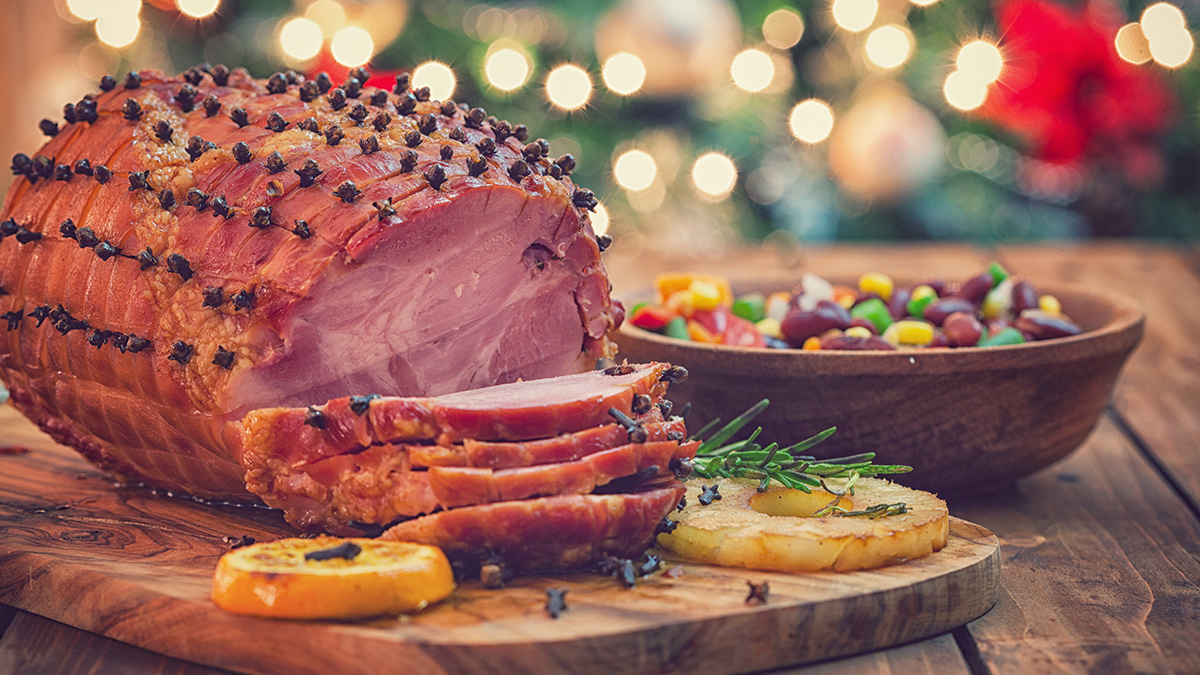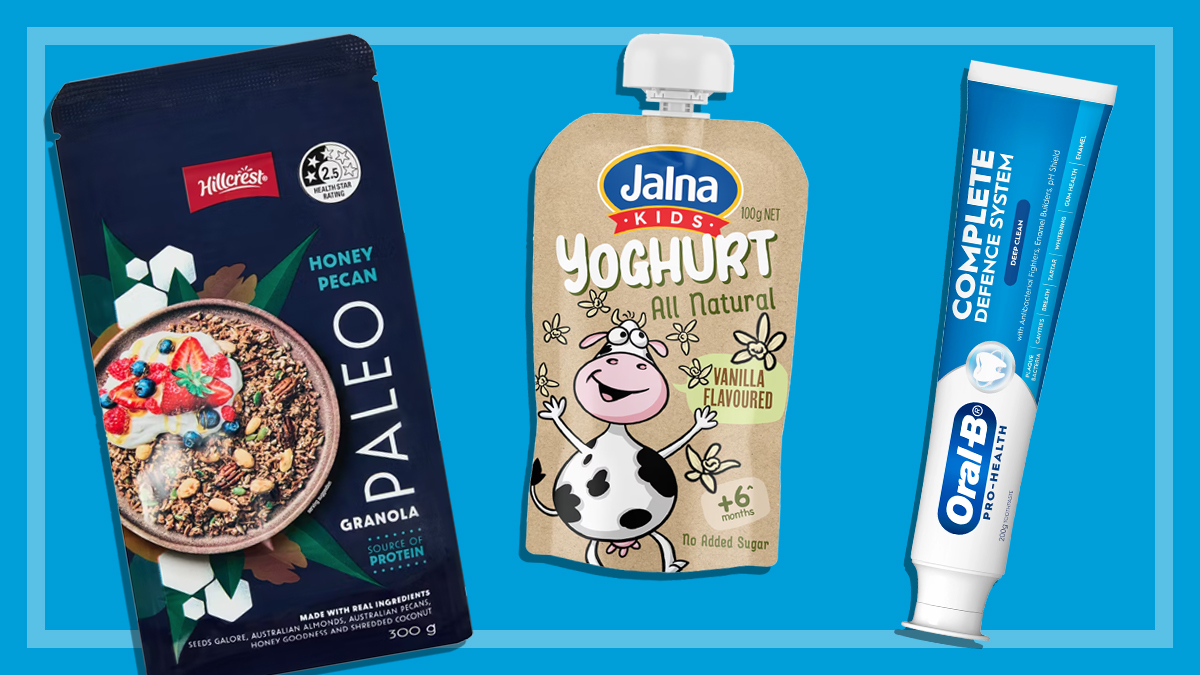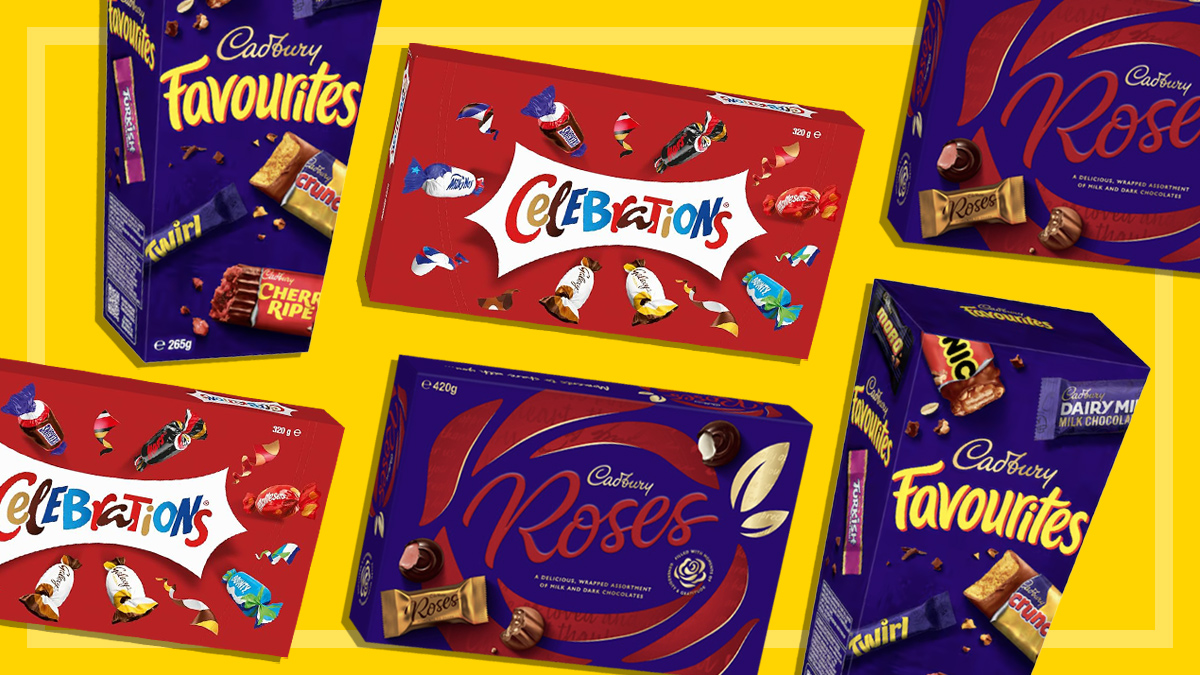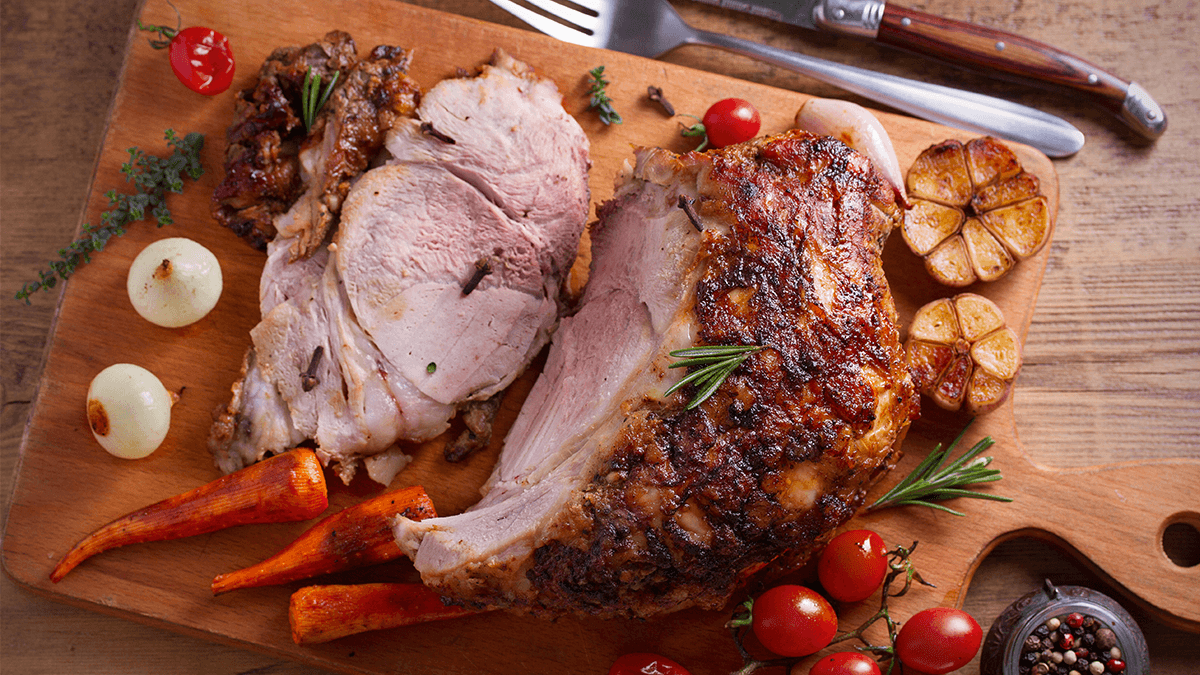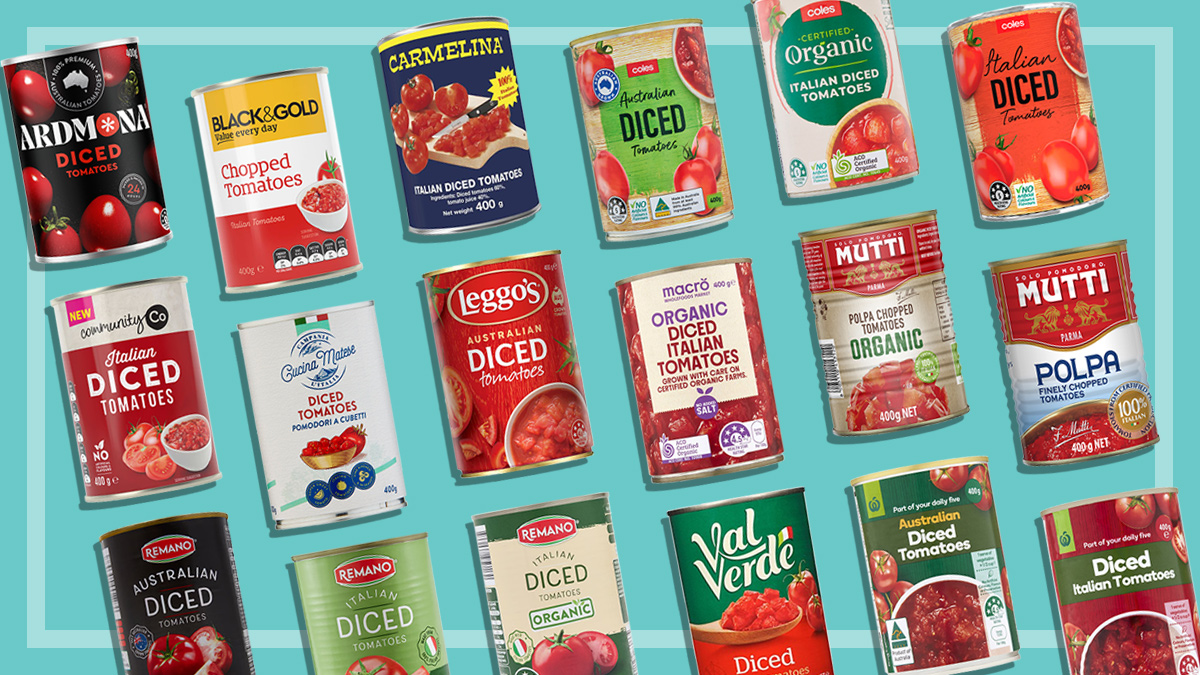Get our independent lab tests, expert reviews and honest advice.
Crackers review
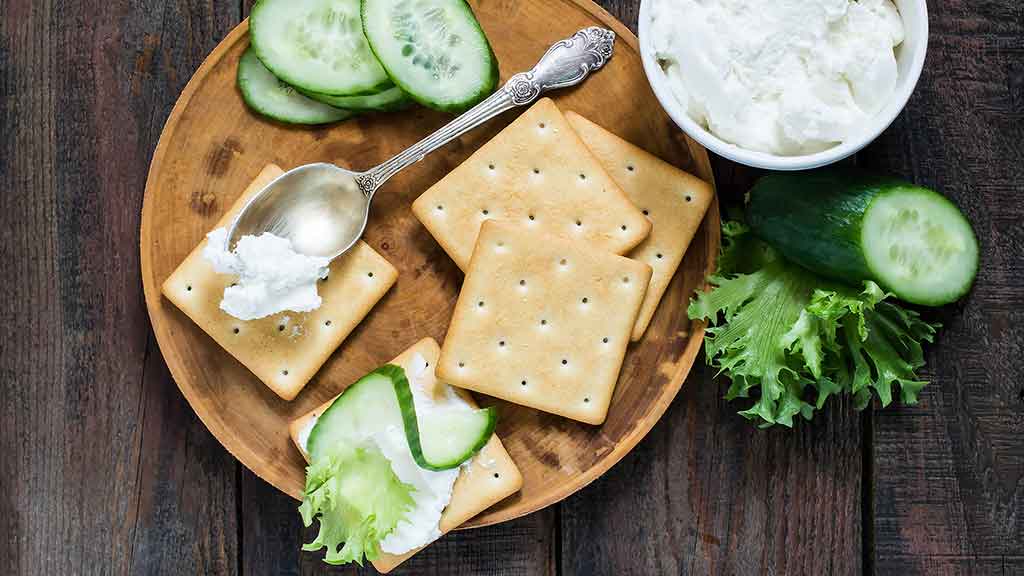
Australians are crackers for crackers. Perhaps it’s their versatility: you can have them with dip, with cheese, topped with salmon or cucumber or just on their own. There’s also the convenience – it’s easy to throw a pack in the picnic basket, the car, your handbag or desk drawer, where they’ll keep perfectly well until you’re ready to eat them. They can also make a great snack for the kids at the park or in their lunchbox.
On this page:
- Are crackers healthy?
- Wholesome wholegrains
- Crackers high in salt
- Are baked crackers better for you?
- How we got our results
- Cracker comparison
There are literally hundreds of different cracker products on offer. So how does your favourite cracker stack up? And which should you choose?
Are crackers healthy?
You may think that crackers are a healthier option than a packet of chips. But when we calculated the Health Star Rating (HSR) for 328 savoury biscuit products, we found they vary hugely when it comes to nutrition, from those worthy of a five-star rating to those that should be considered as occasional treats only – and that’s before you load them up with brie or dip them in the guacamole.
About 40% of the products in our review received a health star rating of just two stars or less – and they tend to be higher in saturated fat and sodium, and lower in fibre. Seven received the maximum rating of five stars.
See our health star rating feature for details on how health stars are calculated.
How to choose healthier crackers
Comparing health star ratings is an easy way to make healthier food choices, and it’s particularly helpful when choosing foods like savoury biscuits where products vary so much in how healthy they are – even within subcategories like rice crackers or crispbreads. But only a small proportion of the products in our review displayed health star ratings on their pack.
Until more food companies start using them, check for wholegrains in the ingredients list and compare crackers using the nutrition information panel on the pack – be sure to use the 100g figures, as serving sizes differ between products.
Don’t have time to compare nutrition information panels or ingredients lists but want the best chance of choosing a healthy option? We calculated the average health star rating for each of the cracker categories reviewed and found that corn cakes, wholegrain crispbreads and wholegrain rice crackers come out on top. So hit those sections of the cracker aisle first.
Highest rating crackers
The following products all have a health star rating of five. Nutrition information is per 100g.
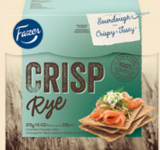
Fazer Crisp Rye
- Energy: 1550kJ
- Sat fat: 0.4g
- Sodium: 600mg
- Fibre: 23g
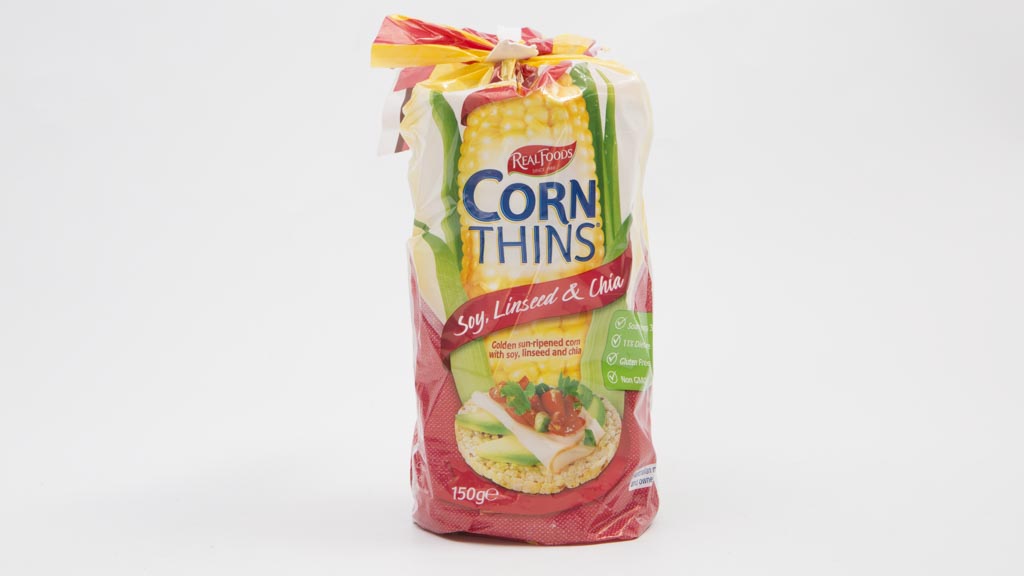
Real Foods Corn Thins Soy, Linseed & Chia*
- Energy: 1642kJ
- Sat fat: 1g
- Sodium: 130mg
- Fibre: 11.1g
*gluten free
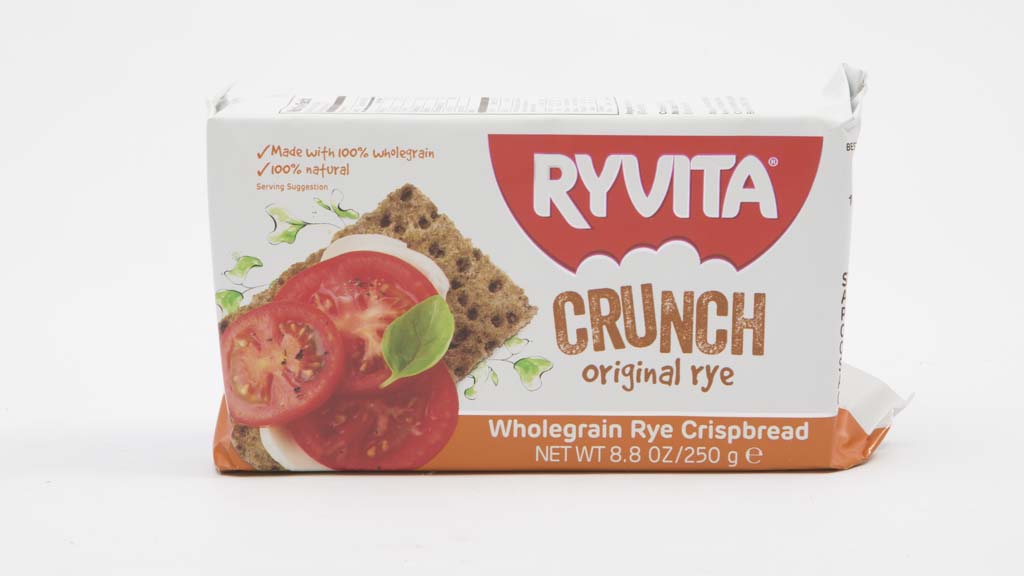
Ryvita Crunch Original Rye
- Energy: 1440kJ
- Sat fat: 0.2g
- Sodium: 290mg
- Fibre:15.2g
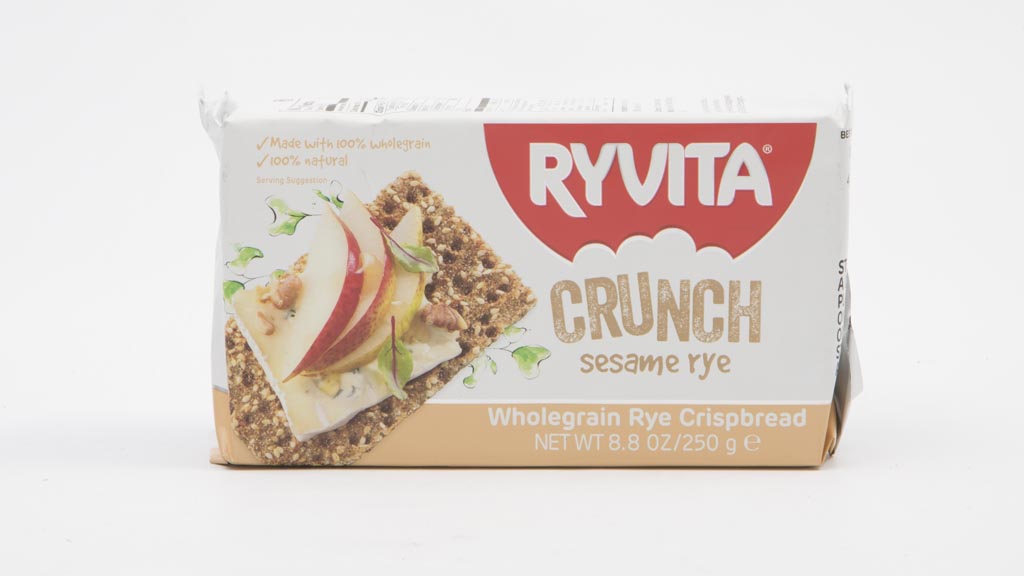
Ryvita Crunch Sesame Rye
- Energy: 1580kJ
- Sat fat: 1.2g
- Sodium: 274mg
- Fibre: 17.4g
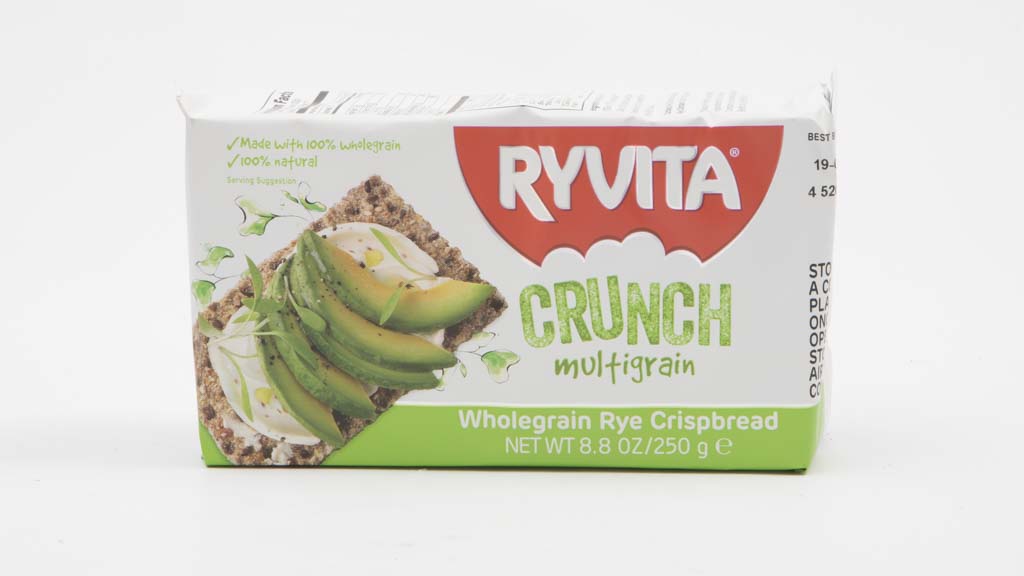
Ryvita Crunch Multigrain
- Energy: 1550kJ
- Sat fat: 1.3g
- Sodium 240mg
- Fibre: 18.3
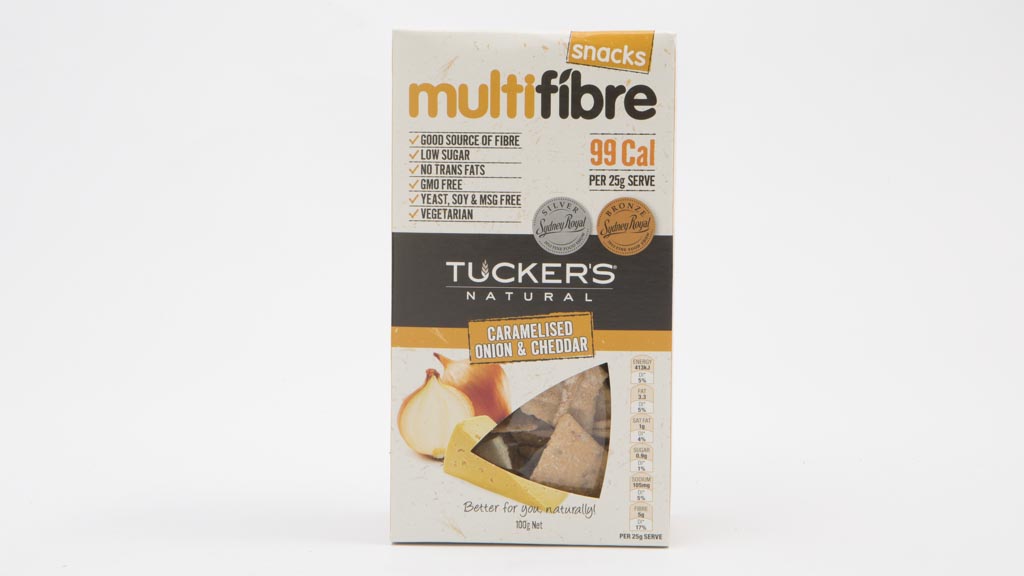
Tucker’s Natural Multifibre Snacks Caramelised Onion & Cheddar
- Energy: 1650kJ
- Sat fat: 3.8g
- Sodium: 420mg
- Fibre: 20.1g
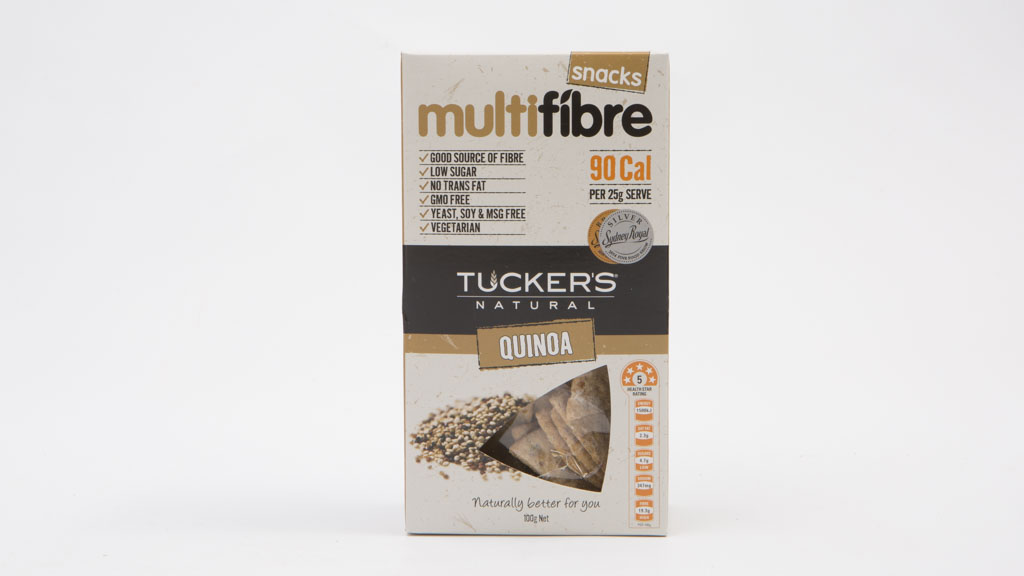
Tucker’s Natural Multifibre Snacks Quinoa
- Energy: 1500kJ
- Sat fat: 2.3g
- Sodium: 350mg
- Fibre: 19.3g
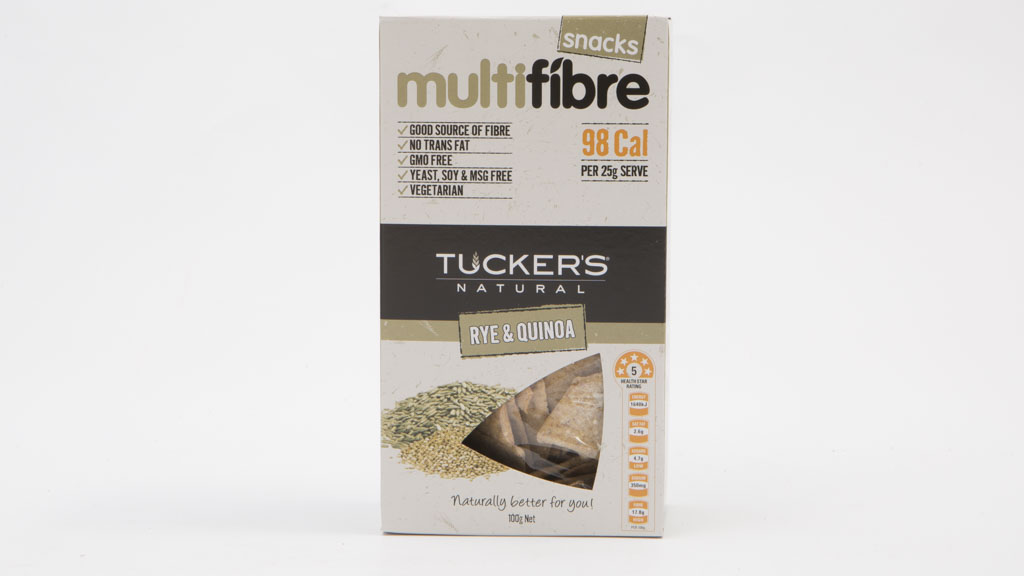
Tucker’s Natural Multifibre Snacks Rye & Quinoa
- Energy: 1640kJ
- Sat fat: 2.6g
- Sodium: 350mg
- Fibre: 17.8g
Wholesome wholegrains
One thing that most of the higher-rating crackers have in common is that they’re made from wholegrains. Take the popular category of rice crackers, for example; the highest rating products (all with an HSR of four) are:
- Peckish Brown Rice Crackers No Salt
- Sakata Wholegrain Sour Cream & Chives
- Sakata Wholegrain Cheddar & Chives
- Sakata Wholegrain Original
- Woolworths Select Brown Rice Crackers Multigrain
So in the absence of a health star rating on the pack to help you choose, one simple thing to look for is a cracker described as ‘wholegrain’, ‘multigrain’, ‘rye’ or ‘brown’, and check for wholegrains or wholemeal in the ingredients list. Among other benefits, wholegrain products tend to be higher in fibre, which will boost their rating. However, you’ll still need to keep an eye out for sodium.
Crackers high in salt
We consider products containing 600mg sodium or more per 100g to be high in salt, and about 60% of the products in our test fall into this category – although that’s hardly surprising given we’re talking about savoury snacks.
But what we did find staggering was that in just 100g, a handful of products in our test had 1600mg (or more) sodium – the amount it’s suggested adults should limit themselves to over a whole day in order to prevent chronic disease. And children need far less than this.
Granted, the serving size suggested on the pack for crackers tends to sit around the 25g mark. A serve of salt-laden Arnott’s Shapes Chicken Drumsticks or Fantastic Bursts Sea Salt & Balsamic Vinegar has about 400mg of sodium, for example – still a quarter of that daily target. But as we all know, crackers can be more-ish and it can be hard to stop eating once the pack has been opened.
On average the least salty crackers are corn and rice cakes and wholegrain rice crackers.
Are baked crackers better for you?
‘Baked not fried’ claims frequently appear on product packs, and they certainly sound reassuring – after all we know that ‘fried’ means ‘fat’. But don’t be tricked into thinking baked products are a healthier choice. ‘Oven baked’ Damora Topz crackers from Aldi and ‘baked not fried’ Woolworths Select Blasts (chicken and pizza), for example, are all about 25% fat and high in saturated fat too – not exactly food you should be eating on a regular basis.
If you’re watching how much saturated fat you eat, opt for corn or rice cakes, wholegrain crispbread or wholegrain rice crackers, the categories lowest in saturated fat on average.
How we got our results
We collated the nutrition and ingredient information for all the cracker products we could find in supermarkets and large grocers – about 400 products in total, including different flavours.
For comparison purposes we put products into categories, based on the categories used by Retail World and Arnott’s (which counts for around one fifth of the products we looked at).
The categories were:
- breadsticks
- corn cakes
- crispbread – regular
- crispbread – wholegrain/wholemeal/multigrain/rye
- flavoured crackers
- general crackers
- lavosh/flatbread
- rice cakes
- rice crackers – brown/multigrain/wholegrain
- rice crackers – regular
- toasts
- wafer/water crackers
We then calculated the health star rating for each product using the calculator provided by the Department of Health. HSRs are based on 100g of the product and range from half a star to five stars – the more stars the better.
It’s not mandatory to label total dietary fibre, so where fibre data was missing we used the average fibre value for that category to calculate the HSR, and we’ve footnoted this in the table.
Where insufficient nutrition and ingredient information was available we excluded the product from our review. In total we were able to compare 328 different products.
Cracker comparison
| Product | HSR | Energy (kJ) | Sat. fat (g) | Sugars (g) | Sodium (mg) | Fibre (g) |
|---|---|---|---|---|---|---|
| Always Fresh Grissini Rosemary & Sea Salt | 1.5 | 1790 | 2.5 | 5 | 1120 | (A) |
|
Always Fresh Grissini Sesame & Sea Salt | 2 | 1810 | 3.7 | 4.9 | 840 | (A) |
|
Always Fresh Grissini Three Seed & Sea Salt | 1.5 | 1880 | 3.8 | 0.8 | 1260 | (A) |
|
Ciao Italia Grissini Sesame | 2 | 1865 | 2.3 | 2 | 800 | 2.8 |
|
Moredough Kitchens Olive Oil Grissini | 2 | 1753 | 1.2 | 0.3 | 757 | (A) |
|
Moredough Kitchens Parmesan Grissini | 2 | 1705 | 2.77 | 0.3 | 802 | (A) |
|
Moredough Kitchens Rosemary Grissini | 2 | 1723 | 2.8 | 0.3 | 757 | (A) |
|
Val Verde Salt Grissini | 1.5 | 1724 | 1.3 | 2.8 | 1200 | (A) |
|
Val Verde Sesame Grissini | 2 | 1843 | 2.3 | 2 | 800 | (A) |
|
Val Verde Traditional Grissini | 4 | 1689 | 1 | 1.5 | 90 | (A) |
| Product | HSR | Energy (kJ) | Sat. fat (g) | Sugars (g) | Sodium (mg) | Fibre (g) |
|---|---|---|---|---|---|---|
| Coles Corn Cakes Original | 4 | 1680 | <1 | <1 | 322 | 5.9 |
| Coles Corn Cakes Thin | 4.5 | 1599 | <1 | <1 | 259 | (A) |
| Healtheries Thin Corn Grain Wafers Grains & Sunflower Seeds | 3.5 | 1510 | 0.5 | 0.4 | 200 | 1.7 |
| Healtheries Thin Corn Grain Wafers Five Grains | 3.5 | 1490 | 0.5 | 0.8 | 200 | 2.1 |
| Healtheries Thin Corn Grain Wafers Wholegrain Corn | 4.5 | 1550 | 0.3 | 0.7 | 100 | (A) |
| Pureharvest Organic Thin Corn Cakes | 4 | 1620 | 0 | 2 | 173 | 2 |
| Real Foods Corn Thins Multigrain | 4.5 | 1624 | 0.5 | 0.7 | 259 | 10 |
| Real Foods Corn Thins Original | 4.5 | 1599 | 0.5 | 0.4 | 259 | 9.8 |
| Real Foods Corn Thins Sesame | 4.5 | 1606 | 0.8 | 0.4 | 225 | 10.2 |
| Real Foods Corn Thins Sour Cream & Chives | 2.5 | 1813 | 1.3 | 3.3 | 840 | 8 |
| Real Foods Corn Thins Soy, Linseed & Chia | 5 | 1642 | 1 | 0.8 | 130 | 11.1 |
| Real Foods Corn Thins Tasty Cheese | 3 | 1822 | 1.5 | 3.8 | 781 | 7.8 |
| Product | HSR | Energy (kJ) | Sat. fat (g) | Sugars (g) | Sodium (mg) | Fibre (g) |
|---|---|---|---|---|---|---|
| Arnott’s Cruskits Corn | 2.5 | 1570 | 0.2 | 0.9 | 889 | 2.1 |
| Arnott’s Cruskits Light | 2.5 | 1590 | 0.3 | 3.7 | 849 | 4.1 |
| Arnott’s Cruskits Original | 2 | 1740 | 5.1 | 3.4 | 787 | 3.8 |
| Arnott’s Cruskits Rice | 3 | 1590 | 0.4 | 0.9 | 607 | 0.9 |
| Arnott’s Salada Light Original | 2.5 | 1600 | 0.7 | 0.3 | 1000 | 4.1 |
| Arnott’s Salada Original | 2 | 1790 | 0.1 | 0.4 | 970 | 3.9 |
| Coles Simply Less Crispbread | 4 | 1882 | 0.4 | 2.3 | 370 | 4.2 |
| Damora (Aldi) Prista Crispbread Lite | 3.5 | 1570 | <1 | <1 | 394 | (A) |
| Damora (Aldi) Prista Crispbread Original | 2 | 1970 | 8.4 | 2.8 | 327 | (A) |
| Freelicious Organic Amaranth & Protein Crispbread | 4.5 | 1580 | 0.2 | 1.4 | 348 | 7.8 |
| Nabisco Premium 98% Fat Free | 3.5 | 1570 | <1 | <1 | 394 | (A) |
| Nabisco Premium Original | 2 | 1970 | 7.4 | 2.8 | 327 | (A) |
| Orgran Chia Crispibread | 3 | 1517 | 0.4 | 0.7 | 560 | 3.4 |
| Orgran Corn Crispibread | 3 | 1485 | 0.3 | 0.9 | 382 | 1.9 |
| Orgran Quinoa Crispibread | 3.5 | 1534 | 0.2 | 1.1 | 577 | 4.2 |
| Ryvita Crackerbread Cheese | 3.5 | 1640 | 0.6 | 1.4 | 530 | 3.3 |
| Ryvita Crackerbread Original | 4 | 1610 | 0.4 | 1.5 | 421 | 4.8 |
| Ryvita Crackerbread Pepper | 3.5 | 1630 | 0.5 | 1.8 | 580 | 3.5 |
| Product | HSR | Energy (kJ) | Sat. fat (g) | Sugars (g) | Sodium (mg) | Fibre (g) |
|---|---|---|---|---|---|---|
| Arnott’s Cruskits Rye | 4 | 1560 | 0.1 | 2.1 | 643 | 7.6 |
| Arnott’s Salada Multigrain 97% Fat Free | 2.5 | 1630 | 0.3 | 0.9 | 960 | 6.3 |
| Arnott’s Salada Wholemeal | 2.5 | 1620 | 3.5 | 1.1 | 940 | 6.9 |
| Arnott’s Vita-Weat 9 Grains | 4.5 | 1710 | 1.1 | 1.8 | 452 | 12 |
| Arnott’s Vita-Weat Ancient Grains & Seeds with Quinoa & Chia | 4.5 | 1700 | 1.1 | 1.9 | 470 | 11.9 |
| Arnott’s Vita-Weat Cracked Pepper | 4.5 | 1640 | 1.2 | 1.8 | 420 | 11.1 |
| Arnott’s Vita-Weat Crackers Multigrain | 3 | 1800 | 1.5 | 3.6 | 680 | 8.2 |
| Arnott’s Vita-Weat Crackers Original | 3 | 1810 | 1.4 | 3.3 | 686 | 6.8 |
| Arnott’s Vita-Weat Crackers Sesame & Poppy Seeds | 3 | 1770 | 1.4 | 3.5 | 684 | 8.1 |
| Arnott’s Vita-Weat Five Super Seeds with Chia & Flaxseed | 4.5 | 1750 | 1.6 | 1.7 | 459 | 12.2 |
| Arnott’s Vita-Weat Lunch Slices Mixed Grain & Toasted Sesame | 4 | 1700 | 1.3 | 6.5 | 483 | 11.4 |
| Arnott’s Vita-Weat Lunch Slices Sesame Pumpkin & Quinoa | 4 | 1710 | 1.4 | 6.7 | 481 | 11.2 |
| Arnott’s Vita-Weat Lunch Slices Soy, Linseed & Sesame | 4.5 | 1700 | 1.3 | 5.7 | 482 | 11.9 |
| Arnott’s Vita-Weat Original | 4.5 | 1630 | 1 | 1.8 | 490 | 11.1 |
| Arnott’s Vita-Weat Sesame | 4.5 | 1750 | 1.4 | 1.6 | 540 | 11.4 |
| Damora (Aldi) Crispetts Light & Crunchy Crispbread | 4.5 | 1630 | 0.4 | 3.2 | 390 | (A) |
| Damora (Aldi) Prista Crispbread Wheat Bran | 3 | 1870 | 6.7 | 3.7 | 482 | (A) |
| Damora (Aldi) Vita Grain Linseed & Soy Wholegrain Crackers | 4.5 | 1710 | 1 | 3.2 | 400 | 10.7 |
| Damora (Aldi) Vita Grain Original Wholegrain Crackers | 4.5 | 1670 | 0.7 | 1.7 | 490 | 9.6 |
| Damora (Aldi) Vita Grain Sea Salt & Cracked Pepper Wholegrain Crackers | 4.5 | 1670 | 0.7 | 1.6 | 600 | 10.3 |
| Fazer Crisp Cumin | 3 | 1440 | 0.3 | 1.4 | 1700 | 21 |
| Fazer Crisp Dark Rye | 3 | 1435 | 0.4 | 7.7 | 1300 | 20 |
| Fazer Crisp Oat | 2.5 | 1710 | 0.9 | 4 | 1600 | 15 |
| Fazer Crisp Rye | 3 | 1550 | 0.4 | 1.4 | 1500 | 23 |
| Leksands Original Swedish Rye Crispbread | 4.5 | 1485 | 0.5 | 1.5 | 500 | (A) |
| Leksands Rye Crispbread Extra Crispy | 4.5 | 1485 | 1 | 1.5 | 500 | (A) |
| Orgran Buckwheat Crispibread | 4.5 | 1520 | 0.5 | 2.3 | 195 | 7.5 |
| Ryvita Crunch Fruit & Seed Wholegrain Rye Crispbread | 4.5 | 1510 | 0.7 | 19.6 | 20 | 14.9 |
| Ryvita Crunch Multigrain Wholegrain Rye Crispbread | 5 | 1550 | 1.3 | 4.9 | 240 | 18.3 |
| Ryvita Crunch Original Rye Wholegrain Rye Crispbread | 5 | 1440 | 0.2 | 3 | 290 | 15.2 |
| Ryvita Crunch Sesame Rye Wholegrain Rye Crispbread | 5 | 1580 | 1.2 | 7.1 | 274 | 17.4 |
| Product | HSR | Energy (kJ) | Sat. fat (g) | Sugars (g) | Sodium (mg) | Fibre (g) |
|---|---|---|---|---|---|---|
| Arnott’s Cheds | 1.5 | 2110 | 7.1 | 1.2 | 878 | 2.9 |
| Arnott’s Country Cheese | 1.5 | 1790 | 4.4 | 5.1 | 1320 | 3 |
| Arnott’s Shapes Barbecue | 2 | 2030 | 5.6 | 0.9 | 708 | 3.4 |
| Arnott’s Shapes Cheddar | 1.5 | 2000 | 7.2 | 1.6 | 764 | 3.2 |
| Arnott’s Shapes Cheese & Bacon | 2 | 1960 | 4.1 | 0.6 | 776 | 3.3 |
| Arnott’s Shapes Chicken Crimpy | 1.5 | 1960 | 4.1 | 7.1 | 958 | 3 |
| Arnott’s Shapes Chicken Drumstick | 1 | 1950 | 4.2 | 7.8 | 1620 | 2.8 |
| Arnott’s Shapes Extreme BBQ Ribs Blast | 2.5 | 1820 | 2.2 | 2 | 767 | 3.9 |
| Arnott’s Shapes Extreme Chilli Charge | 2.5 | 1820 | 2.3 | 2.4 | 665 | 4 |
| Arnott’s Shapes Extreme Peri Peri Chicken Slam | 2 | 1820 | 2.3 | 1.4 | 818 | 4 |
| Arnott’s Shapes Extreme Salt & Vinegar Smash | 2.5 | 1820 | 2.3 | 0.3 | 757 | 3.9 |
| Arnott’s Shapes Light & Crispy Balsamic Vinegar & Sea Salt | 2.5 | 1850 | 1.9 | 2.7 | 885 | 3.8 |
| Arnott’s Shapes Light & Crispy Honey BBQ Chicken | 2.5 | 1870 | 2 | 3.1 | 803 | 3.8 |
| Arnott’s Shapes Light & Crispy Lime & Cracked Pepper | 2.5 | 1930 | 2 | 1 | 773 | 4 |
| Arnott’s Shapes Light & Crispy Sour Cream & Chives | 2.5 | 1940 | 2.1 | 2.9 | 766 | 3.9 |
| Arnott’s Shapes Light & Crispy Sweet Chilli & Sour Cream | 2.5 | 1860 | 2 | 3.5 | 771 | 4 |
| Arnott’s Shapes Light & Crispy Tasty Cheddar & Chives | 2.5 | 1870 | 1.9 | 2.2 | 847 | 3.8 |
| Arnott’s Shapes Nacho Cheese | 2 | 1920 | 4.6 | 1.4 | 822 | 3 |
| Arnott’s Shapes Pizza | 2 | 2070 | 5.3 | 1.9 | 564 | 3.3 |
| Arnott’s Shapes Savoury | 1.5 | 2000 | 6 | 0.4 | 959 | 3.6 |
| Arnott’s Shapes Sensations Balsamic Vinegar & Sea Salt | 2 | 1820 | 2.4 | 2.1 | 894 | 3.8 |
| Arnott’s Shapes Sensations Basil Pesto & Parmesan | 2 | 1860 | 2.6 | 2.5 | 830 | 3.9 |
| Arnott’s Shapes Sensations Caramelised Onion & Cheddar | 2.5 | 1820 | 2.6 | 3 | 794 | 3.9 |
| Arnott’s Shapes Sensations Dijon Mustard & Honey | 2.5 | 1820 | 2.5 | 3.5 | 794 | 3.8 |
| Arnott’s Shapes Sensations Honey Soy Chicken | 2 | 1880 | 2.6 | 3 | 837 | 4 |
| Arnott’s Shapes Sensations Roasted Garlic & Parmesan | 2 | 1870 | 2.8 | 2.2 | 915 | 4 |
| Coles Snack Bites BBQ | 1.5 | 2014 | 9.2 | 2.2 | 560 | 1.2 |
| Damora (Aldi) Snakos Barbeque | 1 | 1820 | 9.6 | 1 | 981 | (A) |
| Damora (Aldi) Snakos Cheese & Bacon | 1.5 | 1810 | 9.1 | 1.1 | 637 | (A) |
| Damora (Aldi) Snakos Chicken | 1 | 1880 | 10.1 | 5.3 | 900 | (A) |
| Damora (Aldi) Snakos Pizza | 1.5 | 1840 | 9.2 | 2 | 667 | (A) |
| Eta Cravers Barbeque | 2 | 1920 | 1.6 | 2.6 | 1070 | (A) |
| Eta Cravers Chicken | 1.5 | 1900 | 1.6 | 2.3 | 1160 | 2.7 |
| Nabisco Ritz Snackz Sour Cream & Onion Flavour | 1 | 2020 | 9.9 | 8.4 | 898 | (A) |
| Nabisco Ritz Snackz Spiced Paprika Flavour | 1 | 2020 | 9.8 | 6.6 | 1080 | (A) |
| Nabisco Ritz Snackz Tasty Cheese Flavour | 1 | 2020 | 10 | 6.9 | 740 | (A) |
| Specially Selected (Aldi) Cheese & Pepper Bites | 0.5 | 2400 | 29 | 2 | 367 | (A) |
| Specially Selected (Aldi) Pecorino Cheese & Olive Bites | 0.5 | 2390 | 28.3 | 1.4 | 466 | (A) |
| Wellaby’s Crackers Classic Cheese | 1 | 1840 | 8.7 | 4.5 | 1200 | 2.9 |
| Wellaby’s Crackers Feta Olive Oil & Oregano | 1 | 1840 | 8.7 | 4.5 | 1200 | 2.9 |
| Wellaby’s Mini Crackers Grated Parmesan | 2 | 1799 | 10 | 4.5 | 300 | 3.6 |
| Woolworths Select Blasts Barbeque | 1.5 | 1960 | 6.8 | 3.2 | 644 | (B) |
| Woolworths Select Blasts Chicken | 0.5 | 2090 | 11.2 | 6.7 | 726 | (B) |
| Woolworths Select Blasts Pizza | 0.5 | 2130 | 11.4 | 3.4 | 830 | (B) |
| Product | HSR | Energy (kJ) | Sat. fat (g) | Sugars (g) | Sodium (mg) | Fibre (g) |
|---|---|---|---|---|---|---|
| Always Fresh Pettini Crackers Rosemary & Sea Salt | 1.5 | 1820 | 5.5 | 8.3 | 983 | (A) |
| Always Fresh Pettini Crackers Sea Salt | 1.5 | 1790 | 5.3 | 9.7 | 1160 | (A) |
| Always Fresh Pettini Crackers Whole Wheat | 1.5 | 1800 | 5.4 | 8.3 | 1020 | (A) |
| Arnott’s Cheeseboard | 2 | 1880 | 3.9 | 3 | 884 | 4.6 |
| Arnott’s Harvest Wheat | 1.5 | 2020 | 4.3 | 7.2 | 917 | 5.3 |
| Arnott’s Jatz 97% Fat-Free | 3.5 | 1570 | 0.6 | 4.4 | 768 | 3.8 |
| Arnott’s Jatz Clix | 1.5 | 2050 | 5.8 | 6.1 | 661 | 2.8 |
| Arnott’s Jatz Cracked Pepper | 2 | 1910 | 4.4 | 2 | 878 | 3.7 |
| Arnott’s Jatz Original | 2.5 | 1950 | 3.9 | 6 | 490 | 3.2 |
| Arnott’s Sao | 1.5 | 1900 | 6.2 | 0.5 | 750 | 3.5 |
| Arnott’s Savoy 97% Fat-Free | 3.5 | 1570 | 0.6 | 4.4 | 768 | 3.8 |
| Arnott’s Savoy Cracked Pepper | 2 | 1900 | 4.4 | 2.1 | 958 | 3.8 |
| Arnott’s Savoy Original | 2 | 1970 | 3.9 | 1.3 | 848 | 3.3 |
| Arnott’s Sesame Wheat | 2 | 1960 | 4.5 | 1.3 | 1110 | 4.8 |
| Carr’s Assorted Biscuits for Cheese | 1.5 | 1900 | 8.4 | 8.2 | 549 | (A) |
| Coles Checkers Crackers | 2 | 1925 | 2.1 | 4.2 | 826 | (A) |
| Coles Cracker Squares | 2 | 1870 | 7.1 | 2.1 | 616 | 4.3 |
| Coles Rosemary Crackers | 2 | 2020 | 2.8 | 8.2 | 760 | (A) |
| Damora (Aldi) Eton | 1.5 | 1780 | 7.8 | 5.4 | 800 | (A) |
| Damora (Aldi) Sanz | 1.5 | 1920 | 7.7 | 1.7 | 800 | (A) |
| Damora (Aldi) Topz Crackers Original | 1 | 2090 | 13.2 | 7.8 | 749 | (A) |
| Eskal Deli Crackers Original | 1.5 | 1967 | 9.8 | 2.1 | 750 | (A) |
| Freelicious Original Crackers | 1.5 | 1940 | 7.6 | 3.1 | 900 | (A) |
| Nabisco Ritz Crackers Original | 1 | 2080 | 13.2 | 7.8 | 749 | (A) |
| Woolworths Gold Oatcakes Chive | 2 | 1880 | 9 | 7 | 380 | (A) |
| Woolworths Gold Oatcakes Olive Oil | 3.5 | 1870 | 2.7 | 0.1 | 530 | (A) |
| Woolworths Homebrand Traditional Cracker Squares | 2.5 | 1790 | 4.2 | 5.4 | 508 | (A) |
| Woolworths Select Garlic Crackers | 3 | 2110 | 1.8 | 1.8 | 440 | 3.5 |
| Woolworths Select Original Wheaten Biscuits | 2.5 | 2040 | 1.6 | 3.7 | 720 | 5.6 |
| Woolworths Select Rosemary Wheaten Biscuits | 2 | 2020 | 2.8 | 8.2 | 760 | 2.6 |
| Woolworths Select Sea Salt Crackers | 3 | 2030 | 1.6 | 2.3 | 530 | 2.6 |
| Woolworths Select Snapz Crackers Cracked Pepper | 1 | 1980 | 9.2 | 2.7 | 740 | (B) |
| Woolworths Select Snapz Crackers Light 97% Fat Free | 3.5 | 1650 | 0.7 | 5.6 | 544 | (A) |
| Woolworths Select Snapz Crackers Original Salt | 1.5 | 1970 | 8 | 4.2 | 680 | (B) |
| Product | HSR | Energy (kJ) | Sat. fat (g) | Sugars (g) | Sodium (mg) | Fibre (g) |
|---|---|---|---|---|---|---|
| Always Fresh Crispini Cracked Pepper & Sea Salt | 3 | 1670 | 4.1 | 4.6 | 867 | (A) |
| Always Fresh Crispini Sea Salt | 3.5 | 1690 | 4 | 5.2 | 592 | (A) |
| Barb Buggy’s Barossa Kitchen Barossa Bark Nigella | 3.5 | 1700 | 7.9 | 6.2 | 164 | (A) |
| Barb Buggy’s Barossa Kitchen Barossa Bark Salt & Pepper | 3.5 | 1700 | 7.9 | 6.2 | 164 | (A) |
| Barb Buggy’s Barossa Kitchen Barossa Bark Sesame | 3.5 | 1700 | 7.9 | 6.2 | 164 | (A) |
| Kurrajong Kitchen Lavosh Bites Original | 3 | 1820 | 6.1 | 5.7 | 711 | (A) |
| Kurrajong Kitchen Lavosh Original | 3 | 1820 | 6.1 | 5.7 | 710 | (A) |
| Kurrajong Kitchen Lavosh Poppy & Sesame Seed Bites | 3 | 1820 | 6.1 | 5.7 | 710 | (A) |
| Kurrajong Kitchen Lavosh The Original Bite Size | 3 | 1820 | 6.1 | 5.7 | 711 | (A) |
| Kurrajong Kitchen Lavosh Thins Caramelised Onion & Sea Salt | 3 | 1807 | 5.3 | 2.9 | 767 | (A) |
| Kurrajong Kitchen Lavosh Thins Rosemary & Sea Salt | 1.5 | 1760 | 7.2 | 5.5 | 2100 | (A) |
| Perfetto Mini Ciabatte | 2.5 | 1640 | 0.8 | 2.9 | 990 | 3.8 |
| Perfetto Spelt Mini Ciabatte | 2.5 | 1720 | 1.4 | 2.5 | 990 | 6.5 |
| Tucker’s Natural Gourmet Bites Rosemary & Rock Salt | 2.5 | 1860 | 8 | 4.7 | 980 | (A) |
| Tucker’s Natural Gourmet Crackers Caramelised Onion | 2.5 | 1910 | 8.2 | 4.5 | 700 | (A) |
| Tucker’s Natural Gourmet Crackers Coriander & Cracked Pepper | 2.5 | 1890 | 8.1 | 4.4 | 710 | (A) |
| Tucker’s Natural Gourmet Crackers Four Cheese & Chives | 2.5 | 1890 | 8.3 | 3 | 720 | (A) |
| Tucker’s Natural Gourmet Crackers Poppy Seed | 3 | 1900 | 7.7 | 4 | 630 | (A) |
| Tucker’s Natural Gourmet Crackers Rosemary & Rock Salt | 2.5 | 1860 | 8 | 4.7 | 980 | (A) |
| Tucker’s Natural Multifibre Snacks Caramelised Onion & Cheddar | 5 | 1650 | 3.8 | 3.7 | 420 | 20.1 |
| Tucker’s Natural Multifibre SnacksChia Linseed & Freekeh | 4.5 | 1720 | 3.2 | 4.6 | 350 | 13.6 |
| Tucker’s Natural Multifibre Snacks Chilli | 4.5 | 1640 | 2.6 | 7.5 | 440 | 17.3 |
| Tucker’s Natural Multifibre Snacks Quinoa | 5 | 1500 | 2.3 | 4.7 | 350 | 19.3 |
| Tucker’s Natural Multifibre Snacks Rosemary & Rock Salt | 3.5 | 1620 | 2.8 | 4.7 | 960 | 22 |
| Tucker’s Natural Multifibre Snacks Rye & Quinoa | 5 | 1640 | 2.6 | 4.7 | 350 | 17.8 |
| Tucker’s Natural Wholegrain Bites Supergrain | 3.5 | 1670 | 3.3 | 7.1 | 688 | 22.4 |
| Waterthins Lavosh Fig | 3 | 1740 | 1.3 | 9.1 | 740 | (A) |
| Waterthins Lavosh Honey | 3.5 | 1740 | 1.3 | 11.5 | 690 | (A) |
| Product | HSR | Energy (kJ) | Sat. fat (g) | Sugars (g) | Sodium (mg) | Fibre (g) |
|---|---|---|---|---|---|---|
| Damora (Aldi) Flavoured Rice Cakes Sea Salt & Balsamic Vinegar | 2 | 1700 | 0.7 | 1.8 | 1100 | (A) |
| Damora (Aldi) Flavoured Rice Cakes Sour Cream & Chives | 3 | 1770 | 0.9 | 3 | 710 | (A) |
| Damora (Aldi) Thin Rice & Corn Cakes | 4 | 1650 | <1 | 1.8 | <5 | 3.1 |
| Damora (Aldi) Thin Rice Cakes Original | 4 | 1600 | 0.6 | 1.1 | 2 | 4.5 |
| Healtheries Thick Rice Grain Wafers Sour Cream & Chives | 2.5 | 1680 | 1.2 | 3.6 | 762 | (A) |
| Healtheries Thick Rice Grain Wafers Wholegrain Rice | 4 | 1530 | 0.5 | 0.5 | <5 | 3.2 |
| Macro Wholefoods Market Organic Thick Rice Cakes | 4 | 1640 | 1 | 0.6 | 225 | (A) |
| Pureharvest Natural Rice Cakes | 4 | 1660 | 0.9 | 0.2 | 0 | 3.8 |
| Pureharvest Organic Rice Cakes | 3.5 | 1620 | 0.9 | 0.5 | 222 | 3.1 |
| Real Foods Rice Thins Wholegrain | 4 | 1677 | 0.7 | 0.9 | 175 | 3.7 |
| Sun Rice Lime & Cracked Pepper Thin Rice Cakes | 2 | 1690 | 1 | 5.4 | 1090 | 3.4 |
| Sun Rice Rice & Corn Thin Rice Cakes | 4 | 1630 | <1 | <1 | 3 | 4.7 |
| Sun Rice Rice & Quinoa Thin Rice Cakes | 4 | 1640 | <1 | 1.5 | 119 | 4.2 |
| Sun Rice Roast Chicken Thin Rice Cakes | 2.5 | 1690 | 1.2 | 2.7 | 779 | 3.7 |
| Sun Rice Salt & Balsamic Vinegar Thin Rice Cakes | 2 | 1650 | 1.1 | 1.9 | 1250 | 3.7 |
| Sun Rice Sour Cream & Chives Thin Rice Cakes | 2.5 | 1690 | 1.5 | 4.2 | 808 | (A) |
| Sun Rice Sundried Tomato & Basil Thin Rice Cakes | 2.5 | 1680 | 1.2 | 4.9 | 840 | 4.1 |
| Sun Rice Sweet Chilli & Sour Cream Thin Rice Cakes | 1.5 | 1680 | 1.5 | 6.5 | 1130 | 3.6 |
| Sun Rice Tasty Cheese Thin Rice Cakes | 2 | 1680 | 1.4 | 4.1 | 924 | 3.7 |
| Sun Rice Thick Rice Cakes Original | 4 | 1630 | <1 | <1 | 3 | 5 |
| Sun Rice Thin Rice Cakes Original | 4 | 1630 | <1 | <1 | 3 | 5 |
| Product | HSR | Energy (kJ) | Sat. fat (g) | Sugars (g) | Sodium (mg) | Fibre (g) |
|---|---|---|---|---|---|---|
| Arnott’s Vita-Weat Rice Crackers Multigrain | 2 | 1960 | 1.7 | 0.6 | 871 | 3 |
| Coles Brown Rice Crackers | 3.5 | 1700 | <1 | <1 | 240 | 2 |
| Coles Brown Rice Crackers Seeds & Grains | 3.5 | 1730 | 0.8 | 0.8 | 210 | 3 |
| Damora (Aldi) Brown Rice Crackers Multigrain | 3.5 | 1780 | 0.8 | 1 | 560 | (A) |
| Damora (Aldi) Brown Rice Crackers Original | 3.5 | 1780 | 0.8 | 0.5 | 550 | (A) |
| DeliGrains Brown Rice Crisps Black Sesame | 3 | 1823 | 1.3 | 0.4 | 532 | 3.1 |
| DeliGrains Brown Rice Crisps Multigrain | 3.5 | 1722 | 0.5 | 0.4 | 532 | (A) |
| Eat Rite Wholegrain Brown Rice Sea Salt & Apple Cider Vinegar Crackers | 2.5 | 1800 | 0.7 | 1.21 | 937 | (A) |
| Fantastic Goodies Seeds & Grains Quinoa, Buckwheat, Millet & Amaranth | 3.5 | 1720 | 1.1 | 1.1 | 606 | (A) |
| Fantastic Goodies Seeds & Grains Sesame, Poppy, Sunflower & Mustard seeds | 3.5 | 1840 | 1.7 | 1.5 | 605 | (A) |
| Peckish Brown Rice Crackers Lightly Salted | 3.5 | 1560 | 3.3 | <1 | 140 | (A) |
| Peckish Brown Rice Crackers No Salt | 4 | 1810 | 2.8 | <1 | 53 | (A) |
| Sakata Wholegrain Cheddar & Chives | 4 | 1720 | 1.2 | 3.8 | 448 | 8.9 |
| Sakata Wholegrain Original | 4 | 1690 | 1 | 1.7 | 399 | 9.4 |
| Sakata Wholegrain Sour Cream & Chives | 4 | 1710 | 1.4 | 4.3 | 526 | 8.7 |
| Woolworths Select Brown Rice Crackers Black Sesame | 3.5 | 1780 | 1.3 | 0.3 | 275 | 4.2 |
| Woolworths Select Brown Rice Crackers Cracked Pepper & Olive Oil | 3.5 | 1750 | 1.1 | 1.1 | 157 | 3.1 |
| Woolworths Select Brown Rice Crackers Multigrain | 4 | 1710 | 0.9 | 0.9 | 118 | 3.9 |
| Woolworths Select Brown Rice Crackers Sea Salt | 3.5 | 1720 | 1.1 | 0.26 | 162 | 4.5 |
| Product | HSR | Energy (kJ) | Sat. fat (g) | Sugars (g) | Sodium (mg) | Fibre (g) |
|---|---|---|---|---|---|---|
| Arnott’s Vita-Weat Rice Crackers Cheddar & Chives | 2 | 1950 | 1.9 | 2.5 | 887 | 2.8 |
| Arnott’s Vita-Weat Rice Crackers Plain | 2 | 1920 | 1.7 | 0.5 | 873 | 3.1 |
| Arnott’s Vita-Weat Rice Crackers Sweet Chili & Sour Cream | 2 | 1960 | 1.9 | 3.1 | 854 | 2.4 |
| Coles Rice Crackers Cheese | 3 | 1740 | 1.2 | 1.8 | 459 | 2.7 |
| Coles Rice Crackers Plain | 3 | 1670 | <1 | <1 | 391 | 1.5 |
| Coles Rice Crackers Seaweed | 3 | 1580 | 0.3 | 3.9 | 690 | 1.7 |
| Damora (Aldi) Crinkle Cut Rice Cracker BBQ | 2 | 1810 | 0.9 | 8.5 | 790 | (A) |
| Damora (Aldi) Crinkle Cut Rice Cracker Sour Cream & Chives | 1.5 | 1770 | 1.1 | 9.6 | 840 | (A) |
| Damora (Aldi) Rice Crackers Barbecue | 3 | 1710 | 0.4 | 2.6 | 431 | (A) |
| Damora (Aldi) Rice Crackers Cheese | 3 | 1810 | 1.4 | 2.2 | 400 | (A) |
| Damora (Aldi) Rice Crackers Plain | 3 | 1710 | 0.4 | 0.2 | 387 | (A) |
| Damora (Aldi) Rice Crackers Seaweed | 2 | 1600 | 0.2 | 5.6 | 997 | (A) |
| Fantastic Bursts Cheese & French Onion | 1.5 | 1740 | 1.8 | 5.6 | 1150 | (A) |
| Fantastic Bursts Flame Brilled Barbeque | 1.5 | 1760 | 1.7 | 5.8 | 1120 | (A) |
| Fantastic Bursts Sea Salt & Balsamic Vinegar | 1 | 1700 | 1.6 | 3.7 | 1810 | (A) |
| Fantastic Bursts Sour Cream & Chives | 2 | 1760 | 1.9 | 6 | 891 | (A) |
| Fantastic Crisp’ns Barbeque | 1.5 | 1790 | 3.5 | 3.5 | 978 | (A) |
| Fantastic Crisp’ns Cheese | 2 | 1800 | 3.9 | 3.5 | 651 | (A) |
| Fantastic Crisp’ns Original | 2 | 1810 | 3.5 | 1.7 | 586 | (A) |
| Fantastic Crisp’ns Salt & Balsamic Vinegar | 1.5 | 1780 | 4 | 1.9 | 862 | (A) |
| Fantastic Crisp’ns Sour Cream & Chives | 1.5 | 1840 | 4.8 | 5.1 | 737 | (A) |
| Fantastic Crisp’ns Sweet Chilli & Sour Cream | 1 | 1820 | 4.5 | 5.6 | 1250 | (A) |
| Fantastic Delites Flame Grilled Barbecue | 1.5 | 1830 | 1.3 | 5.5 | 1070 | (A) |
| Fantastic Delites Honey Soy Chicken | 2 | 1850 | 1.9 | 8.5 | 842 | (A) |
| Fantastic Delites Sea Salt & Balsamic Vinegar | 1.5 | 1820 | 1.4 | 3.8 | 1600 | (A) |
| Fantastic Delites Sour Cream & Chives | 2 | 1870 | 1.9 | 6.8 | 736 | (A) |
| Fantastic Delites Sweet Chilli & Sour Cream | 1.5 | 1840 | 1.7 | 5.3 | 1060 | (A) |
| Fantastic Delites Vintage Cheddar & Red Onion | 1.5 | 1860 | 2 | 5.4 | 958 | (A) |
| Fantastic Gluten Free Barbeque | 1.5 | 1680 | 1.4 | 5.5 | 1070 | (A) |
| Fantastic Gluten Free Cheese | 1 | 1840 | 5.7 | 7.5 | 1120 | (A) |
| Fantastic Gluten Free Original | 2 | 1690 | 1.4 | 3.4 | 756 | (A) |
| Fantastic Rice Crackers Barbeque | 3 | 1680 | 1.7 | 2.9 | 363 | (A) |
| Fantastic Rice Crackers Barbeque Chicken | 2.5 | 1580 | 1.6 | 2.1 | 641 | (A) |
| Fantastic Rice Crackers Cheddar Cheese | 1.5 | 1780 | 1.6 | 4.6 | 1110 | (A) |
| Fantastic Rice Crackers Cheese | 2 | 1830 | 4.9 | 3.4 | 674 | (A) |
| Fantastic Rice Crackers Chicken | 2 | 1700 | 2.1 | 3.4 | 566 | (A) |
| Fantastic Rice Crackers Oriental Teriyaki | 3 | 1690 | 1.7 | 4 | 414 | (A) |
| Fantastic Rice Crackers Original | 3 | 1700 | 1.7 | 3.4 | 404 | (A) |
| Fantastic Rice Crackers Salt & Vinegar | 1.5 | 1580 | 2.1 | 1.3 | 1190 | 0.2 |
| Fantastic Rice Crackers Seaweed | 3 | 1520 | 0 | 3.7 | 516 | (A) |
| Fantastic Rice Crackers Sour Cream & Chives | 3 | 1610 | 1.9 | 3.5 | 291 | (A) |
| Fantastic Rice Crackers Sweet Chilli & Sour Cream | 2 | 1730 | 1.2 | 6 | 846 | (A) |
| Fantastic Thinner Bite Black Rice Crackers Original | 2 | 1770 | 2.4 | 0 | 711 | (A) |
| Fantastic Thinner Bite Black Rice Crackers Sesame | 2.5 | 1830 | 3.4 | 0 | 388 | 1.9 |
| Fantastic Thinner Bite Rice Crackers Barbeque | 1.5 | 1780 | 3.2 | 4.1 | 860 | 1.4 |
| Fantastic Thinner Bite Rice Crackers Sour Cream & Chive | 2.5 | 1810 | 3.6 | 4.2 | 409 | (A) |
| Peckish Rice Crackers Cheddar Cheese | 3 | 1910 | 2.1 | <1 | 406 | (A) |
| Peckish Rice Crackers Herb & Garlic | 3 | 1890 | 1.7 | <1 | 320 | (A) |
| Peckish Rice Crackers Original | 3 | 1780 | 2 | <1 | 250 | (A) |
| Peckish Rice Crackers Pizza Supreme | 2 | 1890 | 1.5 | <1 | 770 | (A) |
| Peckish Rice Crackers Sea Salt & Vinegar | 1.5 | 1670 | 1.6 | <1 | 1500 | (A) |
| Peckish Rice Crackers Sour Cream & Chive | 3 | 1920 | 2.1 | <1 | 400 | (A) |
| Peckish Rice Crackers Sweet Chilli | 3 | 1770 | 1.9 | 2.2 | 480 | (A) |
| Peckish Rice Crackers Tangy BBQ | 3 | 1800 | 0.9 | <1 | 425 | (A) |
| Peckish Rice Snackers BBQ | 2.5 | 2000 | 3.2 | <1 | 400 | (A) |
| Peckish Rice Snackers Cheese | 2.5 | 2000 | 3.2 | <1 | 400 | (A) |
| Peckish Rice Snackers Sour Cream & Chives | 3 | 2000 | 2.9 | <1 | 400 | (A) |
| Sakata Barbecue | 3 | 1690 | 0.4 | 2.6 | 431 | 0.9 |
| Sakata Cheddar Cheese | 2.5 | 1780 | 1.7 | 3 | 564 | 0.9 |
| Sakata Chicken | 3 | 1700 | 0.4 | 3 | 415 | 1 |
| Sakata Classic Barbecue | 3 | 1740 | 0.7 | 2.6 | 495 | 1.2 |
| Sakata Plain | 3 | 1680 | 0.4 | 0.2 | 387 | 0.9 |
| Sakata Roast Tomato & Balsamic | 2.5 | 1730 | 0.6 | 2.7 | 651 | 1 |
| Sakata Sea Salt & Cracked Pepper | 3 | 1720 | 0.7 | 0.5 | 502 | 0.9 |
| Sakata Sour Cream & Chives | 2.5 | 1740 | 0.9 | 3.1 | 619 | 0.9 |
| Trident Plain Rice Crackers | 3 | 1670 | 1.3 | 0.7 | 250 | (A) |
| Woolworths Homebrand BBQ Flavoured Rice Crackers | 3 | 1760 | 0.7 | 2.1 | 411 | (A) |
| Woolworths Homebrand Plain Rice Crackers | 3 | 1740 | 0.7 | 0 | 450 | (A) |
| Product | HSR | Energy (kJ) | Sat. fat (g) | Sugars (g) | Sodium (mg) | Fibre (g) |
|---|---|---|---|---|---|---|
| Abe’s Bagel Crisps Caramelised Onion & Balsamic Vinegar | 2 | 1880 | 1 | 7.8 | 1190 | 3.5 |
|
Abe’s Bagel Crisps Marlborough Sea Salt | 1.5 | 1820 | 1.2 | 6.9 | 1160 | 3.3 |
|
Abe’s Bagel Crisps Natural | 2.5 | 1850 | 1.2 | 7.1 | 543 | 3.3 |
|
Abe’s Bagel Crisps Roasted Garlic | 3 | 1850 | 1.2 | 6.9 | 530 | 3.6 |
|
Abe’s Bagel Crisps Sour Cream & Chives | 1.5 | 1950 | 1.5 | 10 | 1070 | 3 |
|
Abe’s Bagel Crisps Wood-Fired BBQ | 1.5 | 1820 | 1.1 | 8.1 | 1140 | 3 |
|
Albatros Mini Toasts | 3.5 | 1700 | 4 | 5 | 400 | (A) |
|
Always Fresh Crustini Bruschetta Toasts Olive Oil & Sea Salt | 2 | 1860 | 3.7 | 1.6 | 730 |
(A) |
|
Always Fresh Crustini Bruschetta Toasts Rosemary & Garlic | 3 | 1950 | 4 | 3.2 | 385 |
(A) |
|
Glutino Gluten Free Bagel Chips Original | 2.5 | 1533 | 0 | 10 | 666.7 | (A) |
|
Olympian Mini Toasts | 2 | 1930 | 3.4 | 4.6 | 810 | 4.1 |
|
Pride of France French Toast | 3.5 | 1630 | 0.7 | 6.9 | 600 | (A) |
|
Pride of France Mini Toasts | 2.5 | 1700 | 4 | 7 | 450 | (A) |
|
Waterthins Bagelettes Garlic | 2.5 | 1840 | 1.1 | 6.4 | 720 | (A) |
|
Waterthins Bagelettes Original | 2 | 1850 | 1.1 | 6.2 | 790 | (A) |
| Product | HSR | Energy (kJ) | Sat. fat (g) | Sugars (g) | Sodium (mg) | Fibre (g) |
|---|---|---|---|---|---|---|
| Always Fresh Wafer Crackers Roasted Sesame | 3 | 1640 | 1.8 | 0.3 | 710 | (A) |
| Arnott’s Water Cracker Cracked Pepper | 2.5 | 1830 | 3 | 0.2 | 604 | 4.3 |
| Arnott’s Water Cracker Original | 2.5 | 1790 | 3.2 | 0.1 | 632 | 3.9 |
| Arnott’s Water Cracker Sesame | 2.5 | 1820 | 3.4 | 0.1 | 634 | 4.2 |
| B Finest Wafer Crackers Cracked Pepper | 3.5 | 1660 | 1.3 | 2.1 | 712 | (A) |
| Captain’s Table Water Crackers Classic | 2 | 1940 | 5.5 | <1 | 615 | (A) |
| Captain’s Table Water Crackers Cracked Pepper | 2 | 1930 | 5.5 | <1 | 608 | (A) |
| Captain’s Table Water Crackers Sesame Seed | 2 | 1970 | 5.7 | <1 | 594 | (A) |
| Carr’s Table Water Crackers | 2.5 | 1748 | 3.3 | 1.6 | 600 | (A) |
| Coles Water Crackers Cracked Pepper | 2.5 | 1880 | 4.4 | 2.8 | 640 | 4.9 |
| Coles Water Crackers Original | 2 | 1830 | 4.3 | 3.1 | 670 | 4.6 |
| Damora (Aldi) Admiral’s Quarters Cracked Pepper Water Crackers | 2 | 1930 | 5.5 | <1 | 608 | (A) |
| Damora (Aldi) Fine Wafer Crackers Natural | 3 | 1670 | 2.6 | 2.5 | 610 | (A) |
| Damora (Aldi) Fine Wafer Crackers Pepper & Chives | 2.5 | 1760 | 2.5 | 4.1 | 558 | (A) |
| Harris Farm Water Crackers | 1.5 | 1679 | 1.5 | 5.5 | 1310 | (A) |
| Simply Wize Deli Wafers | 2 | 1530 | 1 | 1 | 890 | 0.9 |
| South Cape Blue Poppy & Rye Crispbread | 2 | 1630 | 1.6 | 8.7 | 1190 | (A) |
| South Cape Classic Crispbread | 1.5 | 1679 | 1.5 | 5.5 | 1310 | (A) |
| South Cape Pepper & Sesame Crispbread | 1.5 | 1650 | 3.2 | 8 | 1180 | (A) |
| South Cape Sundried Tomato & Chives Crispbread | 2 | 1660 | 2 | 6.3 | 1230 | (A) |
| Waterthins Fine Wafer Crackers Natural | 3 | 1670 | 2.6 | 2.5 | 610 | (A) |
| Waterthins Fine Wafer Crackers Pepper & Chives | 2.5 | 1760 | 2.5 | 4.1 | 558 | (A) |
| Woolworths Homebrand Cracked Pepper Water Crackers | 2 | 1810 | 4.4 | 3 | 670 | (A) |
| Woolworths Select Classic Water Crackers | 2.5 | 1780 | 4.3 | 2.8 | 631 | (B) |
| Woolworths Select Cracked Pepper Water Crackers | 2.5 | 1780 | 4.4 | 2.5 | 605 | 4.4 |
| Woolworths Select Wafer Crackers Original | 3.5 | 1660 | 2.5 | 2 | 570 | (A) |
| Woolworths Select Wafer Crackers Sesame & Cracked Pepper | 3.5 | 1680 | 2.4 | 1.9 | 530 | (A) |

